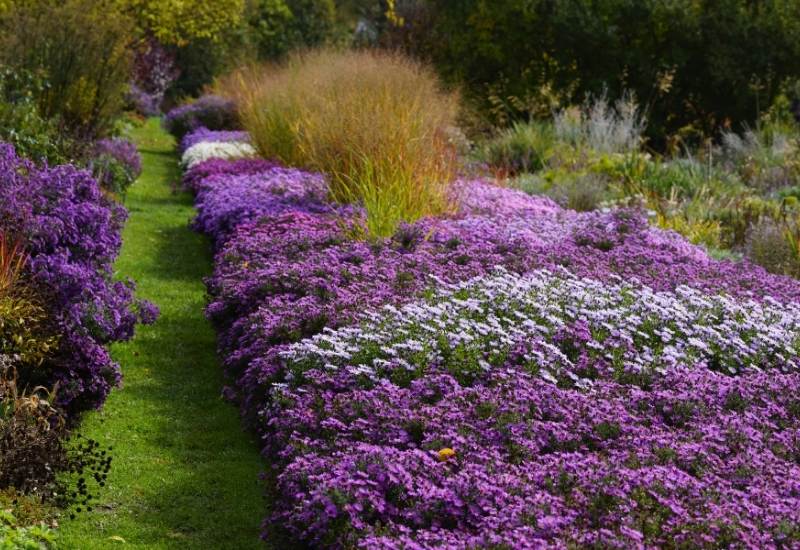
Purple annual flowers are very sought after by gardeners. Depending on whether the color is light or dark, purple blooming annuals will express more sweetness, delicacy or sadness, melancholy to your garden.
Add their shape to this interesting and wide ranging shade and you can have great visual effects, subtle, elegant, exotic or even contrasting and absurd.
Annuals are plants that only live one year. They are handy for gardeners because you can change the planting of your flower beds or borders every year. There is a small range of annuals with purple flowers, from sweet peas to petunias, but they are enough to experiment with this color and its effects in your garden.
If you are looking for annual plants with purple flowers you will find it a hard task. This is because you are being very selective: most flowering plants used in gardening are perennials and purple is not the most common color.
So, we did the hard work for you! We looked for them and put them in a list. But we did more: we matched them with great pictures and wrote down how to grow each one for you. So you are left with the pleasant task of choosing one and growing it…
Purple and Color Combinations
Before we actually start looking at the wonderful plants we have in store for you, there are a few guidelines I would like you to know about the color purple and annual flowers.
To start with, the color purple is a very showy and visible color. This means that you need to be very careful how you use it. Don’t be afraid, and be daring if you want, but be informed too.
Here are some tips:
Purple Annual Flowers in Your Garden or Containers
We said that annual flowers allow you to change the planting in, pattern, look and effect of your flower beds, borders pots etc. That is true, but there are also a few things you need to keep under control.
And now, get ready for an amazing journey in the world of purple annual flowers…
15 Purple Annual Flowers To Add Depth And Richness In your Garden
Depending on the intensity of the color, purple annual flowers can form beautiful, mysterious, bewitching ensembles or elegantly enhance the whole palette of mauves and pinks.
Here are the best 15 annual plants with purple flowers to add a pop of purple to your garden:
1. Mexican Aster ‘Double Click Cranberries’ (Cosmos bipinnatus ‘Double Click Cranberries’)
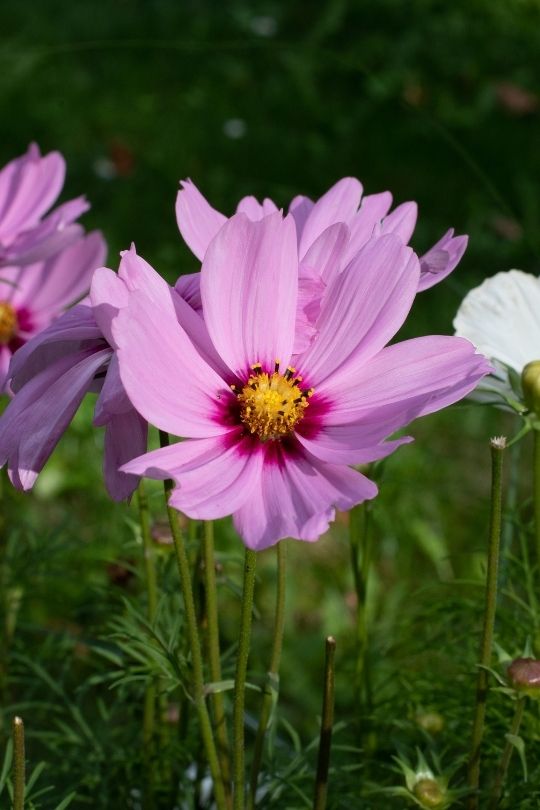
For a flower that embodies the essence of purple, in its deepest and richest shade, Mexican Aster ‘Double Click Cranberries’ is a magnificent choice.
Cosmos are popular elegant looking annuals; their flowers have beautiful texture, as if they were small silk or cotton flowers, or even paper…
There are other varieties within the purple range, and if you prefer single flowers, then the magenta ‘Rosetta’ or the white and purple pink ‘Sensation Picotee’ may be right for you.
But if you want a showy, decidedly purple flower for your beds or borders but also for containers, then ‘Double Click Cranberries’ is in a league of its own.
2. Heliotrope (Heliotropium arborescens)
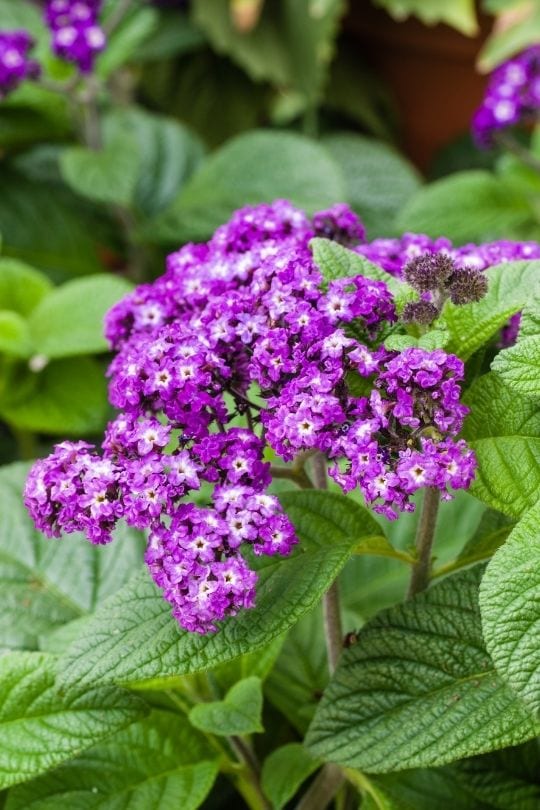
Heliotrope is a small shrub with beautiful large flowers and large and showy clusters of velvety, start shaped rich violet purple flowers. It is a perennial plant in Nature, but gardeners grow it as an annual, a very common practice to maximize the bloom potential of plants that flower more profusely in their first year.
This plant has become very popular in borders, also thanks to its foliage, but also in cottage gardens, as it mixes in perfectly well with other flowers.
On top of the vibrant violet purple of the flowers, you will also get a touch of burgundy purple in the stems and in the veins of the leaves, which adds to its decorative value, especially if you need some leaf color variation.
3. Floss Flower (Ageratum houstonianum)
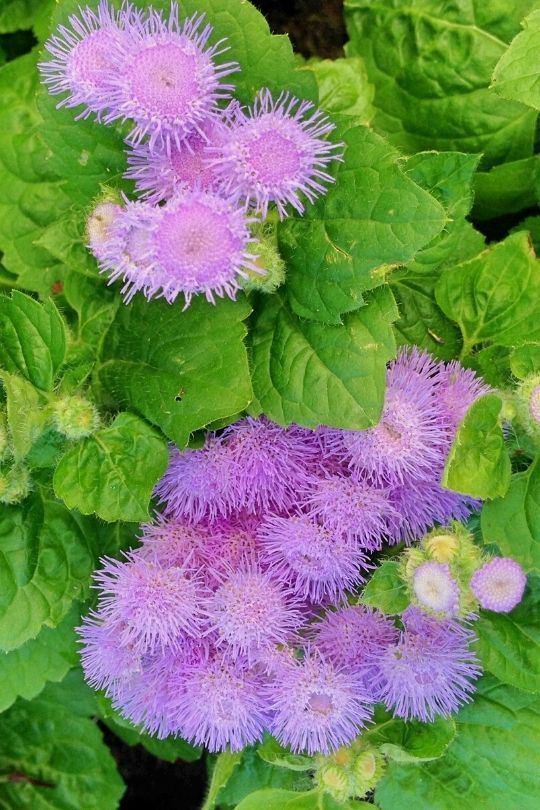
For a sea of lavender to violet purple, floss flower is just perfect. This carpeting perennial will grow fast and it is easy to care. Yet another advantage it has for your garden is that it’s one of the few annuals that grow well in part shade. This makes it quite “precious” for flower beds, borders or anyway shady patches.
The flowers have very thin but numerous petals, which look like fluffy disks, and of course it is from this that it takes its name. There are many cultivars, and not all are purple. However, ‘Blue Danube’, ‘Blue Horizon’, are and ‘Red Top’, despite the name, is bright magenta purple.
While each flower is small, the overall effect is just impressive.
4. Giant Larkspur (Consolida ajacis)
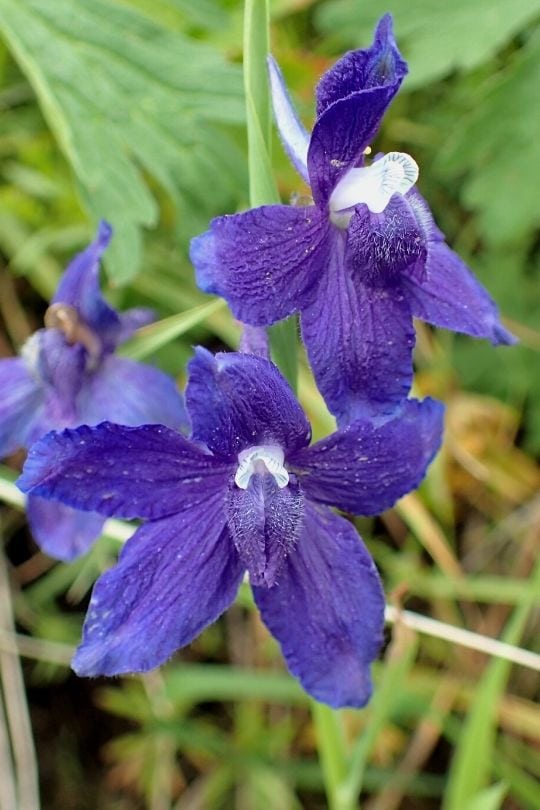
This herbaceous annual will give you tall spikes of rich purple flowers during the summer months. It is an ideal plant for cottage gardens, where it will look perfectly at home, but also for informal borders and flower beds. For best effect, you should grow it in groups.
The plumes may look like lupines from a distance, but when you get close, they will show a thinner, mor lace like texture, which is quite elegant indeed.
It is a perfect plant also if you don’t have the luxury of hot weather, even in summer. In fact, it likes cool places, which means that you can grow it in Canada and in the Northern States of the USA.
5. Morning Glory (Ipomoena indica, Ipomoena purpurea and Ipomoena nil ‘Grandpa Ott’)
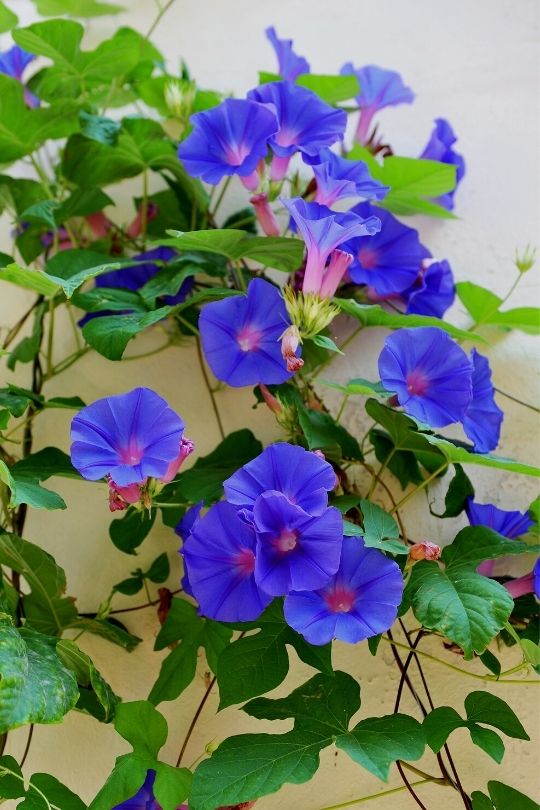
Morning glory must be one of the most famous bell shaped flowers in the world. And purple is a very common color for this vine. This too is a perennial by nature but often grown as annual by gardeners.
Its ability to grow fast and strong is very much appreciated by gardeners. You can grow it to cover a fence or embellish a wall and you won’t have to wait long for the large and showy flowers to appear among the rich green and beautiful heart shaped leaves.
6. Love in a Mist (Nigella damascena)
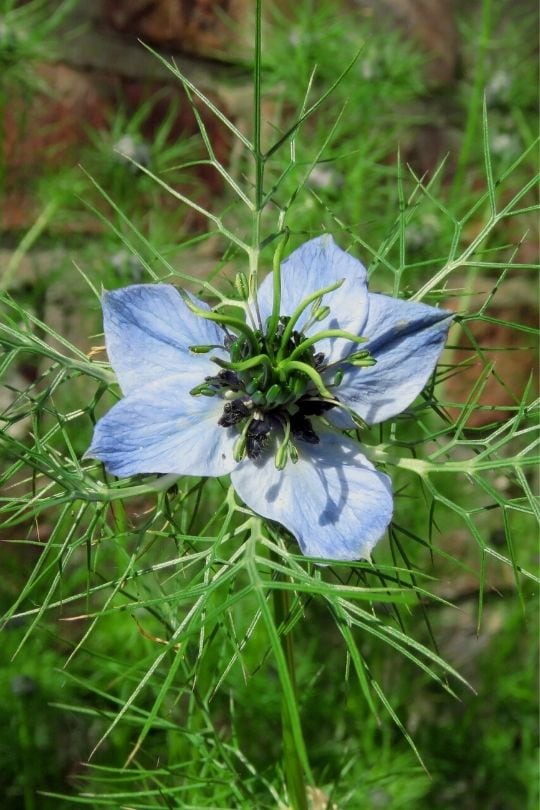
Love in the mist has that wild and original look that many associate with wild prairies, cottage gardens and “old fashioned” flowers. It reminds many people of cornflower, with its very geometric petals that seem to hover above a “mist” of thin leaves…
While it is more common in its blue and white range, it can also be pink or purple. In fact, the cultivar ‘Mulberry Rose’ is purplish pink while ‘The Persian Jewel’ has a rich magenta purple breed.
It can be grown from seed very easily and also naturalized in natural looking lawns and prairies, and it will tolerate even the cold Canadian climate.
7. ‘Superbells Plum’ Calibrachoa (Calibrachoa ‘Superbells Plum’)

This is a lovely trailing plant that will fill with lots of showy, dark magenta flowers all the way from spring to the first frost! It is an excellent choice for hanging baskets but also to exploit height differences in rock gardens, beds or on the steps leading to your front door.
Also called “dwarf petunia” for its looks (they are in the same subfamily), this generous beauty can also be grown as a short lived perennial, which means that it will survive two to three years in the right conditions.
However, most gardeners grow it as an annual as the first year’s bloom is larger and stronger than those of the following years.
8. ‘Purple Queen’ Hollyhock (Alcea rosea ‘Purple Queen’)
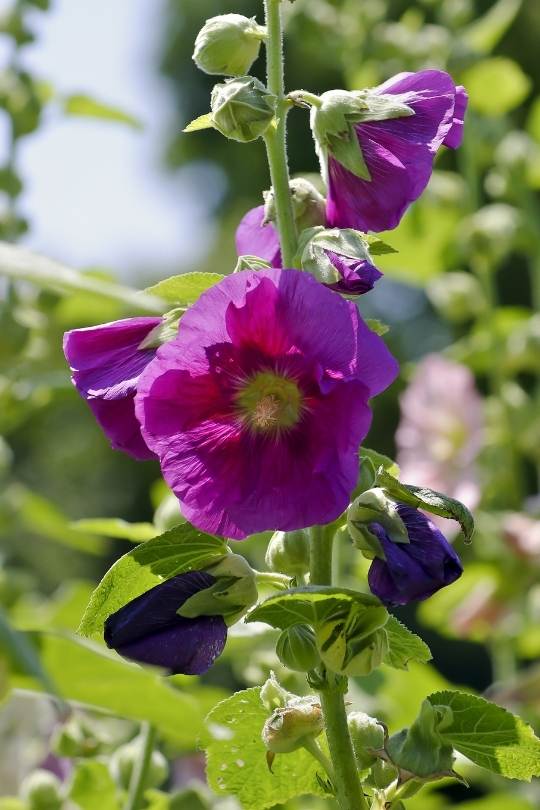
Hollyhock is a favorite annual with many gardeners thanks to its long upright spikes packed with beautiful flowers that look great at the back of borders.
And the cultivar ‘Purple Queen’ offers large and showy flowers that reach 4 inches in diameter (10 cm) and they are of the most vibrant magenta purple shade ever!
This is a wild looking flower that looks great against a wall, in a large border or in a tall flower bed. Its upright habit suits informal gardens, and you can grow it in pots as well.
This variety won the All American Selections prize in 2004.
9. ‘Divine Violet’ Impatiens (Impatiens ‘Divine Violet’)
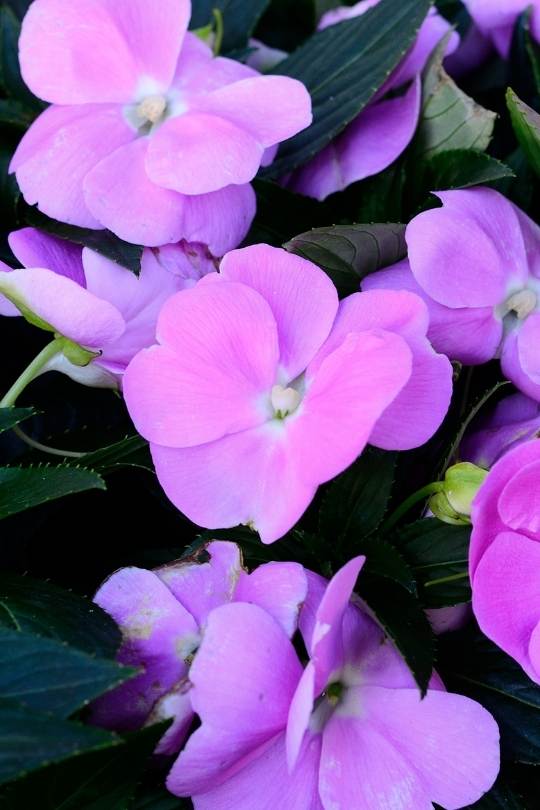
The large, round and sweet looking flowers of impatiens nestling among its very lush and decorative, deeply veined pointed leaves is a spectacle in any garden or container.
And if they are deep magenta purple like with the ‘Divine Violet’ cultivar, then the color balance is perfect and harmonic.
This is yet another “annual but also perennial” plant, which will for sure fill your pots or flower beds with purple flowers from spring to fall, and you may wish to recycle it as a perennial, maybe moving it to a less central place, after you have enjoyed its massive spectacle of her first year.
In the end, it is a winner of the Award of Garden Merit by the Royal Horticultural Society!
10. Petunias (Petunia spp.)
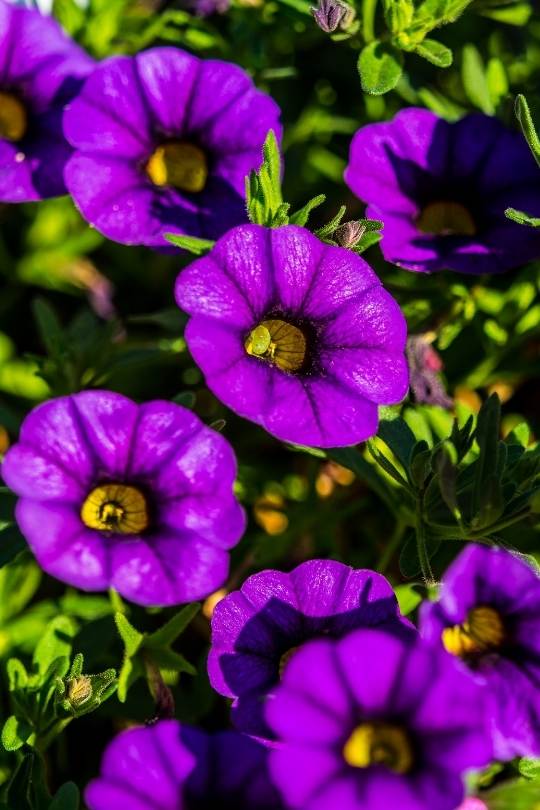
Petunias are of all colors, as you know, and there are some cultivars with the most beautiful shades of purple. In fact, if you want to fill your borders, beds, hanging baskets, patio or terrace with an ingressive display of purple flowers on trailing branches from spring till winter sets in, petunias are a very safe choice.
You can also pick and choose from a wide range of different purple colors… So, ‘Supertunia Morning Glory Charm’ is of a rich velvet purple shade, as is ‘Supertunia Royal Velvet’. ‘Tidal Wave Purple’ on the other hand is in the burgundy to dark magenta shade.
‘Supertunia Lavender Skies’ is of a saturated lavender hue. ‘Easy Wave Violet’ is of the brightest magenta you will ever see.
But maybe the most striking deep, dark and rich burgundy magenta color you can find is in ‘Easy Wave Burgundy Velour’.
Petunias too can live longer than one year, but most gardeners grow them as annual to make the best of their first year’s vigorous blooms.
11. Sweet Peas (Lathysus odoratus)

Sweet peas are just fantastic. They grow fast, they produce a sea of stunning and sweet smelling flowers, and, finally, they exist in every shade of color and color combination on Earth! Including all the purple shades.
From dark magenta to pastel or even watercolor lavender shades, you can find a sweet pea that is perfect for your trellis, patio, pergola, fence or even to cover that dull wall that bugs you every time. And they will do it in a matter of weeks!
Really, the choice of cultivars in the purple range is huge, so, I will only mention some super notable ones. ‘Matucana’ is a great choice for a strong color contrast; it has vibrant violet keel and wings (the central petals) and bright magenta standards (the outer petals).
‘Promise’ on the other hand is pink purple and white, a very lively and bright combination. ‘Lady Grisel Hamilton’ instead plays with delicate shades of pastel lavender.
Finally ‘Senator’ has a deep purple pattern that looks like it was painted with a crayon on a sky blue background.
Really, if you want a lot of fun, of choices, of flexibility, of flowers, for very little effort, sweet peas are a perfect choice.
12. Stock (Matthiola incana)

Stock will grow spikes of showy but sweet looking, round flowers on long stems that tower above beautiful pointed foliage.
You can have them in many colors, including a very rich violet purple which sets off the green patch at the center very nicely.
This annual flower will look great in borders and cottage gardens.
You cam also grow it in containers but its best setting is always in an informal garden, where it will bring its touch of purple energy early in the year, when most plants are dormant.
13. Love-Lies-Bleeding (Amaranthus cadutus ‘Dreadlocks’
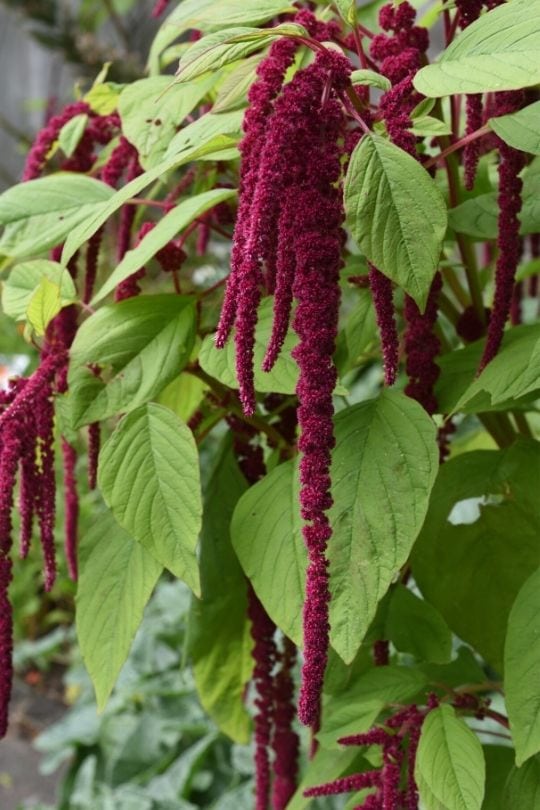
Now imagine deep dark but very vibrant purple plumes that drop from lush, tropical looking but herbaceous foliage… A bit like surreal dreadlocks… Love-Lies-Bleeding will give you just that!
This annual grows tall and fast, producing a lot of foliage and then growing inflorescences that look like fluffy loofahs of the most amazing color.
This is n annual plant that will give a sense of fertility and vitality to your borders in an informal garden setting. It may have other uses, like growing it at the back of a wild prairie to add some height to it, but remember that it has a big and bold presence.
14. Summer Snapdragon (Angelonia spp.)
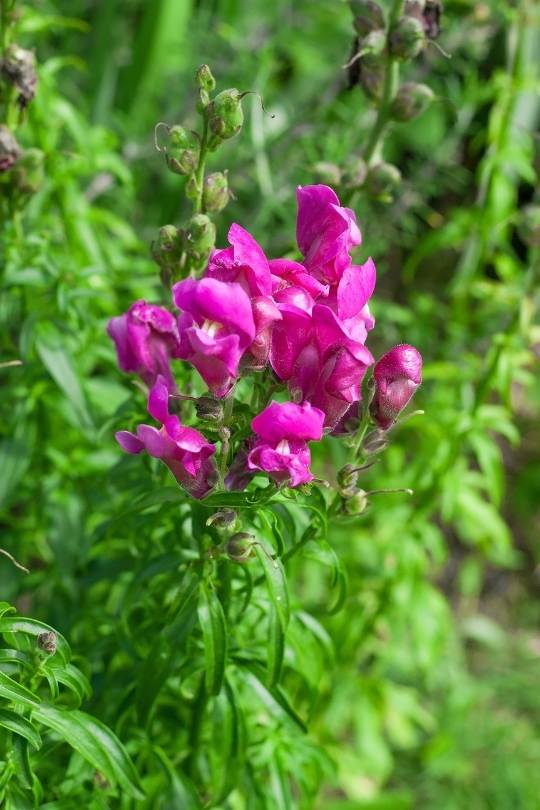
Gardeners grow summer snapdragon as an annual for its beautiful spikes of vibrant and playful flowers as well as for its long and pointed foliage.
It will live well as an annual in most climates, but it can become a tender short lived perennial in warm climates.
The color range of summer snapdragon goes from snow shote to violet purple. ‘Angelface Super Pink’ us of a magenta shade, ‘Angelface Steel Blue’ is light floral violet purple, while ‘Angelface Blue’ is deep violet.
This annual is an excellent addition to beds and borders of informal gardensbut it can also grow in pots and containers.
15. China Aster (Callistephus chinensis)
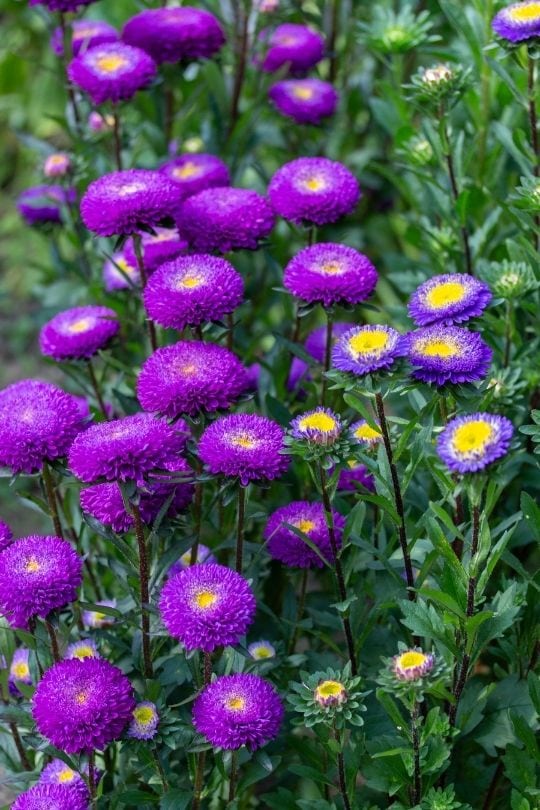
Let’s finish our list with a classic annual, and a classic purple flower: China aster! This beautiful daisy shaped little plant is in fact known for its magenta to violet shades, which make the yellow disk in the middle of the flower stand out even more.
They will bloom for months on end even with little care, and they are just wonderful in flower beds. However, you can also use them in borders, and they do look good in containers too.
It is also an easy annual to find in garden centers or online, and it will grow perfectly well from seed.
This Year’s Color Is Purple!
You now know that even if you are picky, and you want plants with purple flowers as well as plants that are annual, maybe because you want to change your beds and borders next year, you do have a good choice of plants.
Some will look great on walls and trellises, like sweet peas, others are classic flower bed annuals, like Chinese aster; some will bloom in summer to fall (the most common season for purple), others even in the early season. But look through this list again and if purple if your favorite color, sure there is an annual that suits your needs and, above all, your taste…

Written By
Amber Noyes
Amber Noyes was born and raised in a suburban California town, San Mateo. She holds a master’s degree in horticulture from the University of California as well as a BS in Biology from the University of San Francisco. With experience working on an organic farm, water conservation research, farmers’ markets, and plant nursery, she understands what makes plants thrive and how we can better understand the connection between microclimate and plant health. When she’s not on the land, Amber loves informing people of new ideas/things related to gardening, especially organic gardening, houseplants, and growing plants in a small space.
